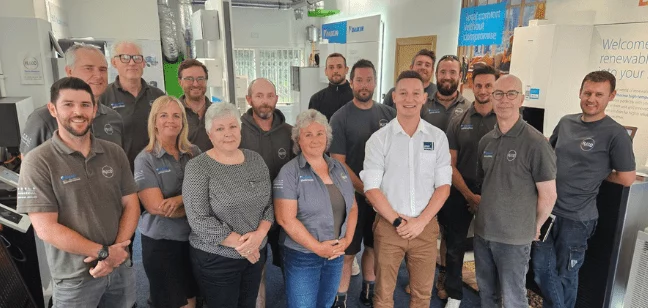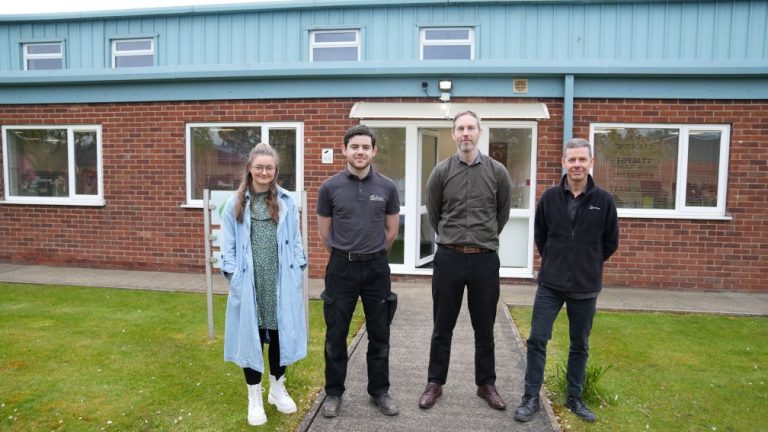- Insertion of a new staircase
- Installation of internal lighting
- Brickwork repairs
- Metalwork repairs
- Paintwork
- Roofing
- Floor repairs
- Drainage
- Interpretation panels
Consent sought for conservation works on Grimsby landmark
Listed Building Consent is being sought for conservation works on Grimsby’s iconic landmark, the Dock Tower.
The Grade I listed structure owned by Associated British Ports (ABP) is the only one of its kind in the country and the work will include key structural repairs on the parapets, building of a new staircase, and drainage.
If approved by North East Lincolnshire Council, work could start on the historical structure later this year in the hope it can reopen to the public.
Simon Bird, Regional Director of the Humber ports, said: “It was during some routine maintenance work that it was picked up some of the further works that needed to be done to ensure the tower remains safe and accessible for the future.
“The Dock Tower is the jewel in the Port of Grimsby. It has been a beacon to so many over the years and for Grimbarians it is a symbol of home. As its custodians we have over the years spent time and money maintaining it, as it has such architectural historic value, and will be here for many more years to come once these essential works are carried out.”
Standing 309 feet (94.2m) tall to the top of the lantern, the tower was completed on 27 March 1852 to power the hydraulic machinery of Grimsby docks. Its height was to achieve the sufficient pressure needed to operate the machines.
It was built by James Meadows Rendel, the civil engineer who constructed the docks at Grimsby between 1844 and 1853 and opened by Queen Victoria when she visited the port in October 1854. Designed by James William Wild, an architect born in Lincoln, he also contributed to the Great Exhibition of 1851 and spent several years in Egypt, and you can see the middle eastern influence on the lantern at the pinnacle.
Jenny Bulmer, Conservation Engineer of Alan Wood & Partners, said: “Opportunities to work on such a unique and historically significant building as this come about rarely. Being able to discover some of the building archaeology and the history of its use throughout the process is a real privilege. Getting to see the tower brought back to life with a renewed purpose is something we can all look forward to.”
The current plans submitted include:
Contractor named for £2.95m sea wall project in Filey
Ipswich-based Jackson Civil Engineering Limited has been appointed as principal contractor for a £2.95m repair scheme to protect Filey’s sea wall, and will start work on site in September, with completion scheduled for next year.
The work is funded by a grant from the Environment Agency, and aims to ensure the sea defence remains viable for the next 50 years.
The scheme will cover a 1.1-kilometre stretch of the coast between Coble Landing in the north and Royal Parade in the south.
The defences were built between the 19th and 20th centuries, protecting 626 residential and 166 non-residential properties, as well as five Yorkshire Water assets, including sewage pumping stations.
Executive member for highways, transport and coastal protection, Cllr Keane Duncan, said: “We are pleased to be able to begin the essential repair scheme which will enhance the condition of the sea wall by replacing damaged blocks, slipways and steps.
“Extensive preparatory work has been carried out to ensure the stability of the wall and public safety. This includes comprehensive surveys and investigations to enable us to choose the best construction method and equipment.
The council has worked closely with its delivery partner and local businesses to minimise disruption. The project is due to begin on 24 August, but construction won’t start until mid-September to avoid the peak tourist season.
Competition and Markets Authority provisionally clears sugar deal
The Competition and Markets Authority (CMA) has provisionally cleared T&L Sugars’ acquisition of Tereos UK & Ireland’s retail sugar business.
The provisional decision – taken by an independent CMA panel – comes after a Phase 2 review revealed that Tereos’ UK retail operation could close.
Azets makes 22 promotions across three Yorkshire offices
Advisory, outsourcing, and compliance group Azets has announced 22 promotions across its Yorkshire business.
Richard Oddy (Restructuring, Leeds) has become a partner while Becky Dawson (Technical Accounting, York), James Durham (ABAS, York), Kim Major (Tax, Leeds), Naveen Sahney (Tax, York) have been promoted to director.
They are among 12 promotions in Azets’ Leeds office, eight in York and two in Bradford.
Russell Turner, regional MD for Azets in Yorkshire, said: “We’re continually investing in people and advisory rich services. These appointments strengthen our breadth and depth of experience and expertise to help our clients achieve their ambitions.
“My congratulations go to all of those celebrating these well-deserved promotions.”
Peter Gallanagh, Azets UK CEO said: “Azets is a purpose-driven organisation that places inclusion at the heart of its values.
“We will continue to build our people strategy and drive cultural change as we continue to be an agile, open, technology led advisory business and accelerate growth.”
Azets has offices in Leeds, Bradford and York, where it employs 334 people.
Rail operator switches Drax trains to run on vegetable oil
DB Cargo UK has switched all trains it operates in and out of Drax Power Station to run on hydro-treated vegetable oil.
DB Cargo UK currently transports around 4.5 million tonnes of biomass pellets to Drax Power Station annually, operating around 60 trains a week to the site.
It is estimated that by switching from traditional red diesel to HVO will reduce rail freight carbon emissions by up to 90%, saving over 12,000 tonnes of carbon each year equivalent to 30 million miles worth of car journeys.
DB Cargo UK’s Chief Sales Officer Roger Neary said the decision by Drax to adopt the use of HVO in its trains was a win for both companies. “The Government had set the rail industry a stretching target to achieve net zero carbon emissions by 2050 and remove all diesel only traction by 2040 so the use of HVO in our trains will go a long way to helping us meet that challenge,” said Roger.
“At the same time, it will help Drax meet its own sustainability targets and minimise its impact on the environment.
“Until a firm commitment is made to electrification of the UK network, HVO is the only credible solution to rail freight decarbonisation. More services could be operated with HVO if the right policies and incentives were in place to enable more customers to make the switch.”
HVO is marketed as one of the world’s purest and greenest fuels. It is synthetically made through the hydro-treatment process from vegetable oils or animal fats which significantly reduces harmful carbon dioxide and nitrogen oxideemissions when used in diesel vehicles and machinery. It is derived from 100% waste products and no virgin products are used in its manufacture.
York company completes another acquisition and expands in the south west
Green Building Renewables has added Poole-based H2ecO Limited to it growing nationwide network, marking the twelfth acquisition in its buy-and-build strategy.
Since formation in 2021 the company has grown from its base at Dunnington near York to have sixteen locations across England.
MD Chris Delaney said: “The acquisition of H2ecO is a significant milestone in our journey toward becoming the UK’s leading green technology installation business by the end of 2025.
“We are thrilled to welcome the team in Poole to the broader Green Building Renewables family. The South Coast is a prime location for homeowners and businesses to benefit from renewable technologies. We look forward to enabling more people in this region to improve the performance of their properties.”
H2ecO, founded by the husband-and-wife duo Mike and Julie Stephenson, has been a pioneering force in the renewable technology sector for 14 years.
Chris added: “We are particularly excited about H2ecO’s on-site training facility, which aligns perfectly with our own ambitions for industry-leading training and development. The quality of their work and their dedication to renewable technology make them an ideal addition to the GBR family.”
New future proposed for former rail training college
A future for the former National College for Advanced Transport and Infrastructure (NCATI) building will be proposed to City of Doncaster Council’s Cabinet next week.
The uniquely designed building on Carolina Way near Lakeside has been closed since July last year and the council has been looking for a new occupant who could continue with the educational purpose of the site.
Cabinet will hear on August 14 that a new provider is interested in taking over the site in keeping with a Department of Education (DfE) covenant which is in place until 2043 that the building must be used for post-16 education and the development of training and skills.
The interested provider, who remains confidential due to commercial negotiations being underway, is expected to sign a 25-year lease with the council, which owns the land and be on site later in the year.
Mayor Ros Jones said: “This is really encouraging news that this iconic looking building could continue as an educational centre in Doncaster. The building itself offers such an exciting opportunity for a new education provider to help support our ambitions for lifelong learning and skills.”
The Cabinet report is asking for authority to finalise lease negotiations and progress the necessary requirements to complete a lease.
Continuing the use of the site in post-16 education would support Doncaster’s Education and Skills 2030 strategy opening up opportunities towards local and skilled employment that will benefit Doncaster’s economy.
HMRC gets tougher on R&D claims
HMRC’s annual report suggests that the tax authority is getting much tougher on historic R&D tax relief claims it suspects may be incorrect or fraudulent.
The new statistics show that the tax under consideration in R&D investigations being carried out by HMRC’s Wealthy and Mid-sized Business Compliance Directorate has doubled over the past year to reach £641m in 2023/24.
Over the last few years, there has been increasing concern about the level of fraud and error in R&D claims. Last year, HMRC published a new analysis of R&D claims in 2020-21 which estimated that almost a quarter (24.4%) of claims by value in the SME scheme and 3.6% of claims in the RDEC scheme were either incorrect or fraudulent – with a combined cost to the Exchequer of an estimated £1.13bn.
While the new report shows the estimated level of “error and fraud” in claims for 2022/23 is almost unchanged, HMRC estimates that its policy and operational measures in 2023/24 – notably the introduction of the Additional Information Form – will have reduced the overall level of error and fraud in claims to 7.8% overall (down from 13.3% in 2022/23).
Commenting on the report, Carrie Rutland, Innovations Incentives partner at accountancy and business advisory firm BDO, said: “We’ve been aware of an increase in HMRC activity in relation to historic R&D claims. Buried in the detail of today’s report are clear signs that the tax authority is getting much tougher when it comes to investigating past claims it thinks were wrong or fraudulent. “In our view, the published increases in tax under consideration must equate to a lot more R&D investigations.
“With an increase in targeted HMRC activity, many businesses may find they are subject to an enquiry triggering a large clawback in R&D tax credits. Many will require specialist advice to ensure their claims, both historic and current, are watertight.”
The new statistics show that the tax under consideration in R&D investigations being carried out by HMRC’s Wealthy and Mid-sized Business Compliance Directorate has doubled over the past year to reach £641m in 2023/24.
Over the last few years, there has been increasing concern about the level of fraud and error in R&D claims. Last year, HMRC published a new analysis of R&D claims in 2020-21 which estimated that almost a quarter (24.4%) of claims by value in the SME scheme and 3.6% of claims in the RDEC scheme were either incorrect or fraudulent – with a combined cost to the Exchequer of an estimated £1.13bn.
While the new report shows the estimated level of “error and fraud” in claims for 2022/23 is almost unchanged, HMRC estimates that its policy and operational measures in 2023/24 – notably the introduction of the Additional Information Form – will have reduced the overall level of error and fraud in claims to 7.8% overall (down from 13.3% in 2022/23).
Commenting on the report, Carrie Rutland, Innovations Incentives partner at accountancy and business advisory firm BDO, said: “We’ve been aware of an increase in HMRC activity in relation to historic R&D claims. Buried in the detail of today’s report are clear signs that the tax authority is getting much tougher when it comes to investigating past claims it thinks were wrong or fraudulent. “In our view, the published increases in tax under consideration must equate to a lot more R&D investigations.
“With an increase in targeted HMRC activity, many businesses may find they are subject to an enquiry triggering a large clawback in R&D tax credits. Many will require specialist advice to ensure their claims, both historic and current, are watertight.”
Offshore Renewable Energy Catapult names non-exec director
Technology innovation and research centre for offshore renewables the Offshore Renewable Energy Catapult, which operates in the Humber, has appointed Maida Zahirovic as a Non-Executive Director.
Maida, Head of Renewables at James Fisher & Sons plc, a supplier of engineering services to the global energy, defence and maritime transport sectors, has significant experience in the offshore wind sector gained from senior roles at some of the top companies in the industry.
ORE Catapult Chair Ronnie Bonnar, said: “There are huge opportunities and challenges for offshore renewables as we look to deliver the growth needed to deliver Net Zero in the coming years.
“Maida’s extensive international and supply chain experience will provide invaluable insight as we continue to grow the Catapult and play a vital role in delivering that opportunity”.
Maida Zahirovic said: “I look forward to working alongside colleagues and stakeholders from industry and academia to drive innovation in our sector and deliver the UK’s Net Zero targets while addressing skills shortages in our industry through training and development.”
Lindum Packaging bolsters team with six appointments
Pallet stability and packaging company, Lindum has welcomed six new staff members to support continued growth within the Stallingborough-based business.
With 12 years of experience in Fast-Moving Consumer Goods (FMCG), Daniel Goldsworthy joins the business as quality manager, a role which involves maintaining product and service quality, completing audits, and looking at work with Net Zero and Ecovadis.
Alastair Roberts brings a wealth of knowledge of the packaging industry to his new role of sales engineering at Lindum, with engineering expertise that will help in the development of new packaging technologies and improve existing processes at the business.
Joining Lindum’s warehouse team are Jason Key and John Cooper, who will manage the day-to-day operations of the company’s warehouse, ensuring operations run smoothly and efficiently. Dave Hebden will strengthen Lindum’s delivery department as a driver.
Finally, in her first role since graduating, Tia McCreadie joins Lindum as a customer service assistant.
Rick Sellars, sales manager at Lindum, says: “At Lindum, we believe that our team is our greatest asset, and the addition of Daniel, Alastair, Jason, John, Dave, and Tia further strengthens our ability to serve our clients effectively. Their diverse skills and fresh perspectives are vital as we continue to innovate and excel in the packaging industry.
“We’re confident that with these new team members on board, we’re better equipped to face the challenges and opportunities that lie ahead and we’re already looking forward to the contributions they will make to the Lindum family.”












